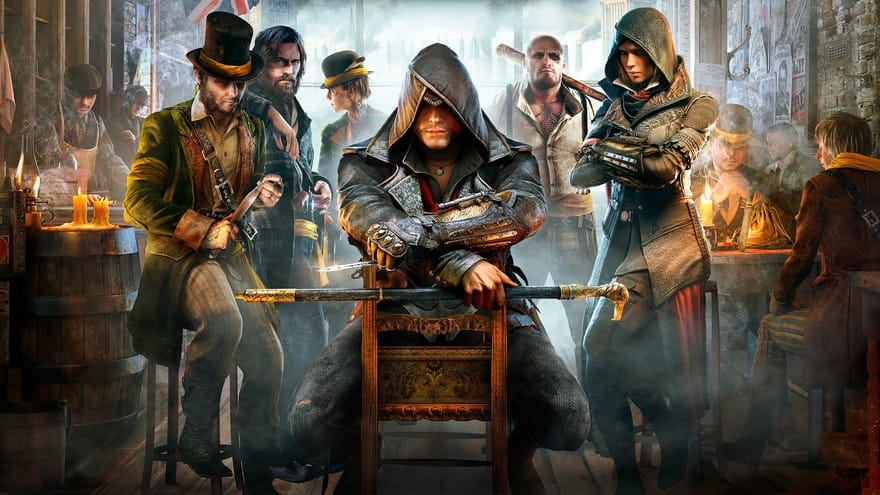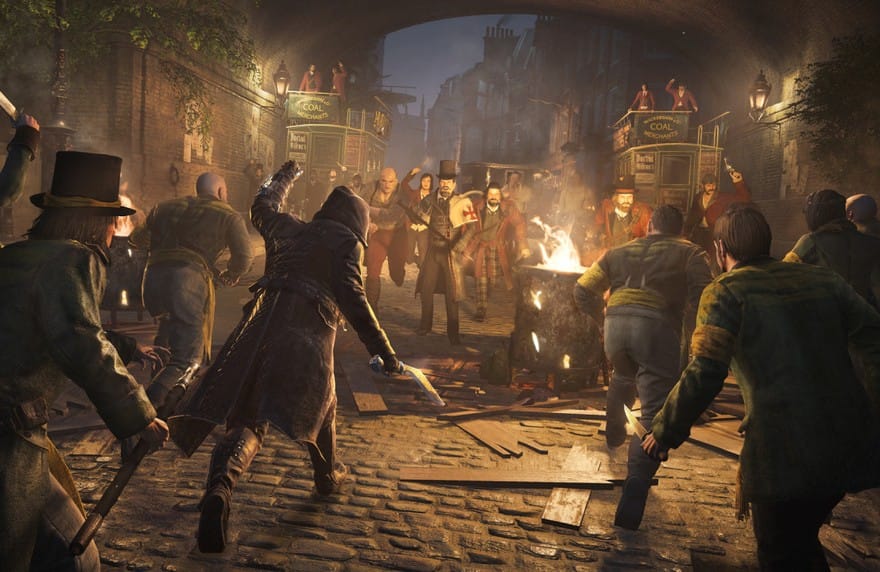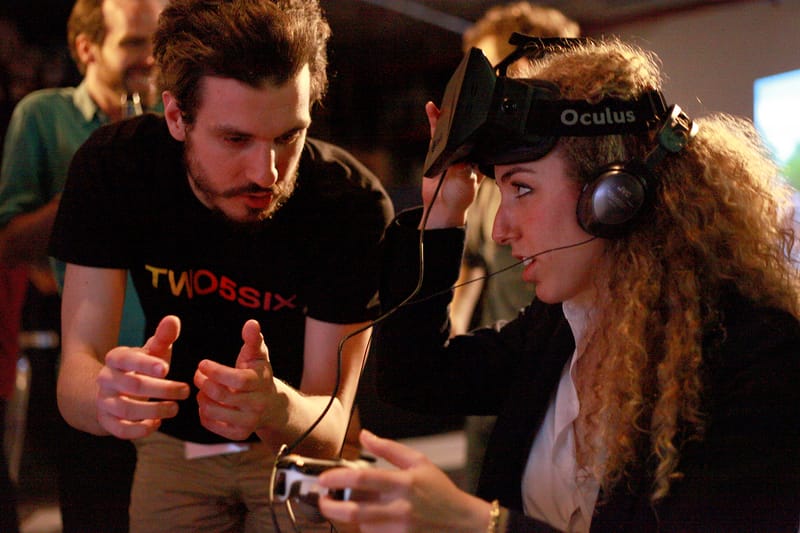“Try the bitter. It’s actually quite drinkable.” So drawls Jacob Frye in Assassin’s Creed: Syndicate’s “cinematic” trailer before punching many men in bowler hats. The hero of the game, he sounds less like a cockney gang-leader and more like a guide at a beer tasting session—his accent is a put-on and his charisma is at rock bottom. This Danny Dyer impression is laughable at best, as is the script, which if going for full Dyer might have settled at “drink up, cunts!” It is all part of an elaborate masquerade of a working class hero and the first sign that no one at Ubisoft has the slightest idea of the context of the game they are making.
I say this because in another trailer, our grizzled hero seems to sport a distinctly higher class of accent, dragging out his vowels like a true member of the landed Gentry. Ironically, while calling London’s working class to arms. That’s not really a surprise: the Assassin’s Creed series has always been about the interests of young rich men, but Ubisoft wants things both ways—the whole London package. They want Danny Dyer and Daniel Craig, Jason Statham and Benedict Cumberbatch, Tom Hardy and, well, Tom Hardy. Pictures of which I imagine decorate the moodboards of many a cubicle at Ubi HQ.

But, you say, there’s a heroine too, let’s not forget her. Rightly so, Evie Frye, Ubisoft’s reaction to player’s growing distaste at their all-male version of history, is Jacob’s twin sister, and predictably, is the sensible one. “Lots of guards, predictable patrol routes, better stick to the shadows,” she drones at the start of a gameplay walkthrough, as if aiming to describe every stealth game in existence. Professional fun spoiler and monotone speaker, the trailers suggest that she might be a bigger blow against women in games than if she was to be kept out entirely. “You might not be looking for war, but war is looking for you,” says Evie. “If it finds me, I’ll bring the lads,” comes Jacobs retort.
“Let’s use the iconic Assassin Rope Launcher to scale the building,” states the game director of Assassin’s Creed: Syndicate in a walkthrough, presumably receiving several financial bonuses as he does. He doesn’t let the question of why he didn’t name the “Assassin’s Rope Launcher” something more catchy trouble him, nor how the new feature of an unreleased game might be considered “iconic.” It’s too late anyway, as within minutes he has already moved onto explaining “Assassin’s Creed: Syndicate 360 Philosophy” (presumably a trademark) a term that brings to mind a thousand whiteboards markers squeaking across a thousand whiteboards. “EXPLORE the area to CREATE opportunities,” says the mission subtitle, its capitalization a thudding sledgehammer blow to any concept of exploration or creation.
Assassin’s Creed: Syndicate 360 Philosophy
Elsewhere, the audio director explains that there will be “fully systemic vehicles that will impact all of the core pillars,” bringing to mind the image of a horse and cart driving into the front of St. Paul’s cathedral repeatedly. Of course, the pillars she is referring to are the ones that are arranged in the 360 degree philosophy, which, in a moment of player choice, can be scaled iconically with the Assassin’s Rope Launcher™. If, unlike me, you are unwilling to watch the vast amount of PR material released on Assassins Creed Syndicate in order to pick out these golden lines, here’s a short trailer that just about covers everything:
I like to think of this trailer as the most honest one within Ubisoft’s entire PR suite, representing what I consider to be the core pillars of Assassin’s Creed as it is today:
Pillar 1: Inexplicable violence of increasing brutality.
Pillar 2: Nonsensical gadgets with a pretense of historical accuracy.
Pillar 3: Shiny technological overlays with nihilistic undertones.
If they were only to add a 5-minute montage of the character unintentionally running up walls while surrounded by a cacophony of collectible flags, pamphlets, badges and feathers, we’d have a comprehensive portrait.
I like to think of this trailer as the most honest one
Also, I hope you watched until the end, because if you did, you would have come across the now-ubiquitous “pre-order now!” message. It is this kind of message that makes me feel vindicated in discussing the game based on the seemingly endless scope of its PR campaign—Ubisoft are demanding we lay our money down now, so why not our opinions? The pre-order message is also notable for the fact that it is advertising something called “The Darwin and Dickens Conspiracy.” Elsewhere in the morass of advertising that surrounds the game, Dickens and Darwin are described as “Industrial era heavy-hitters” as if they were bare-knuckle boxers. You can even unlock Charles Dicken’s Cane Sword, although presumably only if you have pre-ordered. It doesn’t really feel like I need to go into the reason why this is bizarre, but awful? Before you label me a spoilsport, let me point out that the crusade of Assassin’s Creed in recent years has become increasingly disturbing. The willingness with which it reduces the entirety of human history to fetishistic violence is something to be questioned. From Da Vinci to Dickens, these canonical figures are implicated in thousands of murders, granted fictional weapons, and transformed into vindictive violent men.
Assassin’s Creed is a series struggling in its encounter with modern times. Perhaps that’s because it’s a series born of brutality and dark philosophy of Medieval life, tied up in orientalism and romanticism. This wasn’t a mistake, the first game even managed to equate the violence of religious crusades with the symbolic violence of vast faceless corporations. As it enters modernity, the series remains unchanged, still brutal and romantic, but somehow attempting to absorb the changes in philosophy. It wants to be the rich man’s power fantasy and the anti-capitalist revolution, and it doesn’t see why it can’t have both. Like a spoiled child, Assassin’s Creed has had everything it wanted until now, building an almost invincible ego in the process.

A friend once joked with me that the ultimate end point of Assassin’s Creed would be to watch a man in a hoodie dive from the top of the Empire State building, surviving the fall by landing in a dumpster—the distant logic of why that idea ever made sense lost long ago in the rush to pump out a yearly series. While that seems to be a likely turn of events, my lasting image of the franchise is its trailers and their ceaseless montages of knives entering into human bodies at various angles. To me it brings to mind that classic George Orwell quote: “If you want a vision of the future, imagine a boot stamping on a human face—forever.” What Assassin’s Creed and its full-spectrum PR campaign presents is a vision of the past as a knife stabbing a human face—forever. The key difference is that Ubisoft expects you to enjoy it. With that in mind it doesn’t really matter if Syndicate fixes the stealth, or the open-world, or the mind-numbing repetition of a hundred prostitutes to save from attackers, a hundred street urchins to rescue, a hundred hours to watch disappear into nothing. It will still be both bloody and awful, and as painful as Jacob Frye’s accent. Just watch the trailers.





